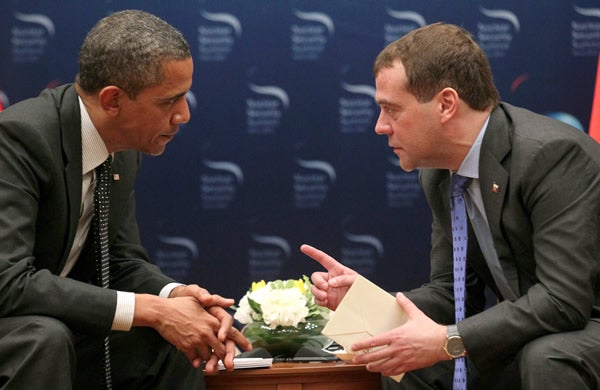The United States does not need to protect itself from a threat of ballistic missiles. At least that is what President Obama suggests in his recent exchange with Dmitry Medvedev, president of the Russian Federation, during the 2012 Nuclear Security Summit in Seoul. “On all these issues, but particularly missile defense, this can be solved but it’s important for him [incoming president Vladimir Putin] to give me space,” stated President Obama. “This is my last election. After my election I have more flexibility,” he continued.
These comments should come as no surprise. The Administration made clear that it is willing to sacrifice U.S. missile defense when it conceded to Russian demands to limit U.S. missile defenses in the New Strategic Arms Reduction Treaty (New START) that entered into force in February 2011. A group of Senators led by Jon Kyl (R–AZ), however, objected to limitations set forth by the treaty. These Senators argued that Moscow will use this language to limit the U.S. missile defense program. Their fears materialized as Russia repeatedly threatened nuclear deployments close to NATO allies’ borders. Moscow also threatened to withdraw from New START if the United States does not “cooperate” with Russia on missile defense.
The Daily Signal depends on the support of readers like you. Donate now
Russia’s definition of missile defense cooperation is problematic to say the least. Regardless of the level of knowledge Russia has of the U.S. missile defense program—a result of hours of unilateral U.S. briefings—Moscow insists on having veto power over Washington’s decision to shoot down a missile on its way toward its victims. On other occasions, Russia demanded binding limitations on speed or geographical coverage of U.S. interceptors.
Due to the pressure of concerned Senators, the President certified that “it is the policy of the United States to continue development and deployment of United States missile defense systems to defend against missile threats from nations such as North Korea and Iran, including qualitative and quantitative improvements to such systems” in New START’s resolution of ratification. It appears the President is ready to walk away from his own commitment.
After all, it would not be the first time that he failed to honor his promises made pursuant to New START ratification. He already failed to provide funding for U.S. nuclear weapons infrastructure, deemed essential at the time of ratification. If left unchecked, the Administration’s policies will lead to America’s becoming increasingly vulnerable. This is the wrong posture for the United States. North Korea is preparing to launch its long-range missile, and ballistic missile proliferation is growing worse. Heritage research shows that a “protect and defend” strategy—which would combine offensive, defensive, conventional, and nuclear weapons—is the best response for this uncertain environment.



























